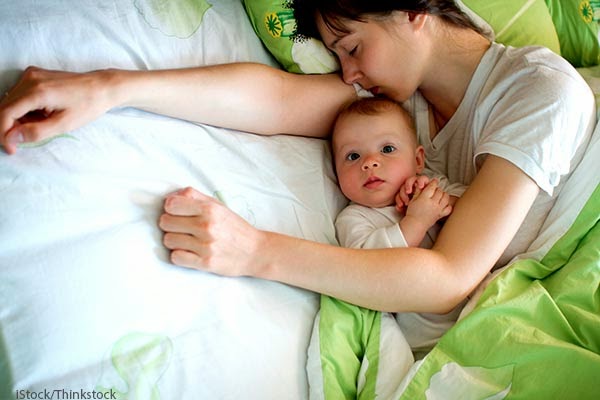Two weeks ago, my baby suddenly started waking every one to two hours at night. He won’t go back to sleep unless I feed or hold him. Does this mean I need to do sleep training?
This is a question I hear several times a week from parents of babies in my Baby and Me! classes and drop-in groups. Many have heard about “sleep regression,” but don’t know how to fix it.
At about 4 months of age, your baby’s sleep pattern changes and becomes more like an adult’s, in that he progresses slowly from drowsy to light sleep and then, finally, deep sleep after about 45 minutes. Because he is spending more time in non-REM (light) sleep, there are more transitions between deep and light sleep, requiring him to use whatever soothing methods he has learned to return to sleep. If he has become accustomed to breastfeeding, sucking on a pacifier, or being rocked to sleep, he will be looking for that in order to return to sleep. This is why, by about this age, it can be helpful to start putting your baby down for sleep while he is still drowsy but awake. Often, after you begin this routine, your baby can put himself back to sleep in the night.
It’s important to note as well that babies at 3 to 4 months are also so much more social and aware of the world. They want to engage anyone and anything and are very easily distracted by just about anything they see or hear. Sleeping in a darkened room, even during the day, possibly with some white noise to drown out the mailman or barking dog down the street, usually helps, the same way that adults sleep better in darkened hotel rooms than light, noisy ones.
Does this mean that the only remedy for frequent night awakenings after 4 months of age is “crying it out?” No!
There are many other factors that can contribute to a baby’s night awakenings—and certainly not all babies will have a 4-, 6-, 12-, or 18-month “sleep regression.” Feeding needs are constantly changing, teething and illness occur, and growth/developmental leaps cause them stress. Each variation from recent patterns warrants consideration and different interventions.
Knowing what is developmentally appropriate for your baby’s age and temperament, as well as your own preferences, is key to knowing how best to help your family’s sleep improve.
Private family consultations are also available by appointment.



